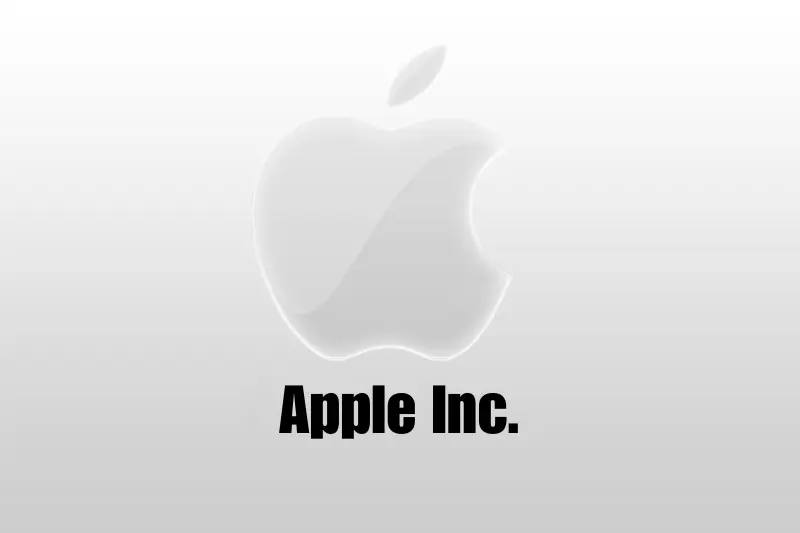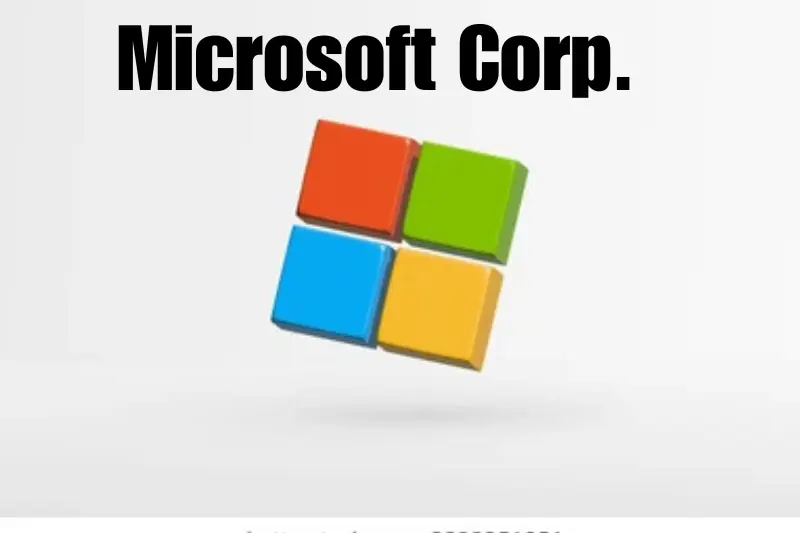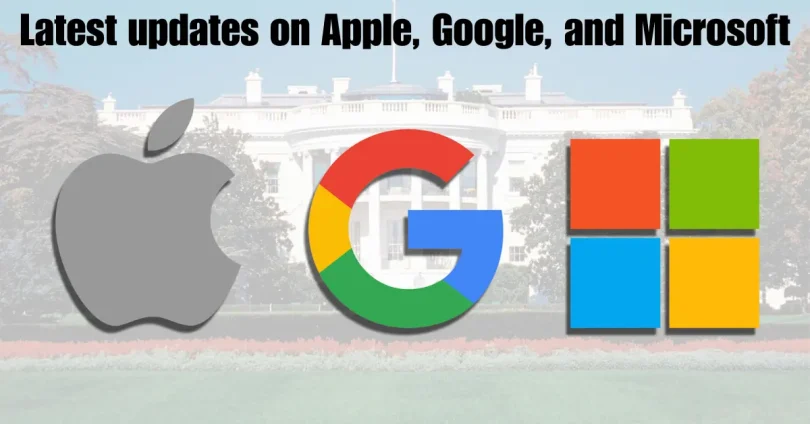In 2025, Apple, Google, and Microsoft remain at the forefront of technological development, continuously shaping the landscape with groundbreaking innovations, shifts in market strategies, and regulatory hurdles. Each of these tech giants has made significant strides in their respective fields—artificial intelligence (AI), app distribution, and cloud computing, among others.
However, with their success also comes increased scrutiny from regulators and new challenges. Here is a comprehensive look at the latest updates on Apple, Google, and Microsoft.
Apple Inc.

1. Compliance with the European Union’s Digital Markets Act (DMA)
One of the most notable updates for Apple has been its response to the European Union’s Digital Markets Act (DMA). The DMA, which aims to reduce anti-competitive practices in the tech sector, has forced Apple to reevaluate its long-standing business practices, particularly in the areas of app distribution and payment systems.
- App Store Modifications: As part of its compliance, Apple has allowed EU users to install third-party app stores and utilize non-Apple payment systems within apps. This marks a significant change for Apple, which had historically restricted third-party app stores and imposed high fees for app developers using its platform.
- Impact on Apple’s Ecosystem: This move opens the iOS ecosystem to greater competition and choice, a substantial shift from Apple’s traditionally controlled app marketplace. The change primarily affects the European Union, but it has the potential to influence global policy shifts, particularly in other regions considering similar regulatory measures. Apple’s decision underscores its need to respond to growing scrutiny over its market dominance in app distribution.
2. Introduction of Apple Intelligence (AI Integration)
In an effort to bolster its AI capabilities and compete with Google and Microsoft, Apple introduced its Apple Intelligence platform in June 2024, incorporating advanced artificial intelligence across its devices.
- On-Device AI: One of the primary goals of Apple’s AI integration is to ensure data privacy. Unlike Google, which relies on cloud-based AI processing, Apple has focused on on-device processing, meaning that AI tasks such as image recognition, predictive text, and voice processing are done locally on the device.
- Enhanced Features: The AI enhancements in iPhones, iPads, and Macs have brought more powerful features such as improved Siri functionality, more accurate photo recognition, and personalized recommendations across apps. Health and fitness apps also benefit from AI, offering users advanced tracking and insights into their physical activity and overall wellness.
- Long-Term Strategy: Apple’s AI strategy positions it as a competitor to Google, particularly in the areas of machine learning and search AI. Apple is focused on creating a privacy-centric ecosystem, aiming to offer users an intelligent experience without sacrificing their personal data.
You may also like to read this:
Top AI-Powered Apps Of 2024 To Enhance Your Daily Life
Biggest Tech Company Updates Of 2025: AI & Innovation
Latest Tech News USA: April 2025 Key Highlights
2025: How AI Is Revolutionizing Businesses In The USA?
Breaking Technology News Today: Cybersecurity And AI News
How New AI Advancements 2024 Are Changing Industries
3. Pixelmator Acquisition and Software Expansion
In late 2024, Apple made a strategic acquisition of Pixelmator, a well-known image editing software for iOS and macOS.
- Software Synergy: Pixelmator is renowned for its powerful editing tools, which will likely be integrated into Apple’s suite of creative software, such as Final Cut Pro and iPhoto. This acquisition allows Apple to offer users even more robust editing features and tools, bringing advanced image manipulation capabilities to its platform.
- Professional Creative Tools: This acquisition expands Apple’s creative ecosystem, making its tools more appealing to professional content creators who need sophisticated editing software. Pixelmator’s addition strengthens Apple’s competitive position in the creative industry, traditionally dominated by software like Adobe Photoshop.
4. Siri Privacy Settlement
Apple reached a $95 million settlement in response to a class action lawsuit regarding Siri’s voice recording practices. The lawsuit claimed that Siri inadvertently recorded private conversations of users who had not activated the voice assistant.
- Privacy Concerns: While Apple denied any wrongdoing, the settlement underscores growing concerns over privacy and user data collection by tech companies. It also highlights the increasing scrutiny of voice assistants, as many users are becoming more aware of how their data is handled.
- Impact on Trust: The settlement may have long-term implications for Apple’s reputation, especially as privacy becomes a major selling point for consumers. Apple will likely face more challenges in maintaining consumer trust as it navigates the evolving landscape of digital privacy and security.
Google (Alphabet Inc.)
1. Enforcement of the Digital Markets Act (DMA) in Europe
Google has faced significant pressure under the EU Digital Markets Act. The European Commission has continued its scrutiny of Google’s search engine dominance, accusing the company of engaging in anti-competitive practices.
- Allegations: The EU claims that Google has manipulated search results to favor its own services, such as Google Shopping and Google Flights, at the expense of competitors. This, according to the Commission, undermines fair competition in the online search and digital advertising markets.
- Consequences: If the allegations are upheld, Google could face substantial fines and may be forced to alter its search algorithms, creating more opportunities for rivals to gain visibility in search results.
2. Antitrust Ruling and Monopoly Concerns
In the United States, Google was handed a significant legal blow in August 2024 when a court ruled that Google had monopolized the search engine market, violating antitrust laws.
- Legal Repercussions: The ruling is based on the claim that Google leveraged its market dominance to control digital advertising and related markets. Although Google has vowed to appeal, the case represents a major challenge for the company, with the potential to force fundamental changes in its operations.
- Market Impact: If upheld, this decision could dramatically reshape the way Google operates, particularly in the search and advertising sectors. The ruling could open the door to new competitors, weakening Google’s longstanding control over digital ad markets.
3. Alphabet’s Record Revenue in 2024
Despite the ongoing regulatory challenges, Alphabet (Google’s parent company) posted a record net income of $94.2 billion in 2024. This growth is largely attributed to the continued success of Google Search, YouTube, and Google Cloud.
- Advertising Dominance: A large portion of Alphabet’s revenue still stems from advertising, especially search ads, which continue to be a dominant source of income for the company.
- Cloud Expansion: Google Cloud has also experienced significant growth, positioning Alphabet as a strong competitor in the cloud computing market, particularly against Microsoft Azure and Amazon Web Services (AWS).
Microsoft Corp.
1. AI-Powered Copilot Integration
Microsoft has been at the forefront of AI adoption, particularly in the enterprise software market. In May 2024, the company introduced AI-powered Copilot technology across Windows and Office products.
- Increased Productivity: The new Copilot-enabled PCs are equipped with specialized AI chips designed to enhance productivity. Microsoft claims these devices are 58% faster than Apple’s top-of-the-line Macs when it comes to productivity tasks. Copilot is designed to assist users in drafting documents, analyzing data, and completing tasks more efficiently.
- Long-Term Strategy: Microsoft’s investment in AI signals its long-term strategy to dominate the enterprise AI space, positioning its Azure platform as the go-to solution for businesses seeking cloud-based AI solutions.
2. Mobile Gaming Store Initiative
Microsoft has announced plans to launch its own mobile gaming store, hoping to challenge the duopoly of the App Store (Apple) and Google Play Store in the mobile gaming market.
- Developer-Friendly: The new store would allow developers to bypass the App Store and Google Play store fees, offering a better revenue share for developers. This initiative is aimed at attracting mobile game developers and providing them with more control over their earnings.
- Regulatory Strategy: The launch is also seen as a response to the regulatory shifts spurred by the EU Digital Markets Act, which aims to provide more competition in app distribution. By creating an alternative to Apple and Google’s app stores, Microsoft hopes to level the playing field for developers.
3. Competition with OpenAI
While Microsoft initially partnered with OpenAI, the two companies are now seen as direct competitors in the field of artificial intelligence.
- AI Rivalry: As OpenAI makes strides in AI-powered search and other technologies, Microsoft has started viewing OpenAI as a competitor rather than a collaborator. This shift is particularly evident in the race to dominate enterprise AI solutions.
- Expansion in AI Services: Microsoft is doubling down on Azure AI and Copilot, ensuring it remains a leading provider of AI-powered services for businesses.
Conclusion
As 2025 unfolds, the latest updates on Apple, Google, and Microsoft reflect how these tech giants are adapting to rapid changes in the technological, legal, and regulatory landscape. Apple is shifting its approach to comply with EU regulations and push forward its AI strategy, while Google faces significant legal challenges over its monopoly in search and advertising. Microsoft, meanwhile, continues to innovate with AI and cloud computing, and is positioning itself to disrupt the mobile gaming industry.
These companies’ innovations and strategies will continue to shape the future of technology in profound ways, balancing between pushing the boundaries of innovation and responding to increasing regulatory scrutiny.
FAQs
1. What is the Digital Markets Act (DMA) and how does it affect Apple?
The Digital Markets Act (DMA) is a European Union regulation aimed at curbing anti-competitive behavior by large tech companies. Apple has had to allow third-party app stores and non-Apple payment systems in the EU, opening up its ecosystem to greater competition.
2. How has Apple integrated AI into its devices?
Apple introduced Apple Intelligence in 2024, focusing on on-device AI to enhance privacy and reduce reliance on the cloud. Features include smarter Siri, photo recognition, and personalized app recommendations.
3. What is the impact of Apple’s Pixelmator acquisition?
Apple acquired Pixelmator in 2024 to enhance its creative tools. The integration of Pixelmator’s image editing features into Apple’s apps, like Final Cut Pro, aims to strengthen its position in the professional creative market.
4. What legal challenges is Google facing in 2025?
Google is facing scrutiny under the EU Digital Markets Act for manipulating search results in favor of its services. It is also dealing with an antitrust lawsuit in the U.S. accusing it of monopolizing the search engine market.
5. How has Google’s advertising revenue been affected?
Despite legal challenges, Google posted record revenue in 2024, driven by its dominant digital advertising platforms, Search, and YouTube. However, ongoing legal pressures could impact its market practices.








